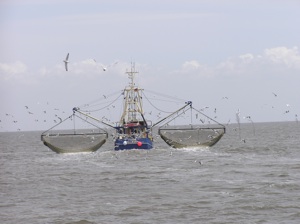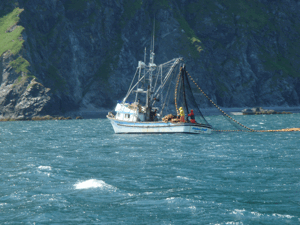Fishy Situation
Air Date: Week of September 10, 2010

Crab boat working in the North Sea. (Wikimedia Commons)
A recent op-ed in the Journal Nature says that some of the policies of the Marine Stewardship Council are suspect. Host Jeff Young speaks with an author of the article about how the MSC blue checkmark can fall short on protecting fish populations. The MSC's regional director for the Americas region defends the council’s standards in supporting sustainability.
Transcript
YOUNG: You might not have heard of the Marine Stewardship Council, but if you’ve shopped for seafood at a Whole Foods or WalMart lately you’ve probably seen its work. The MSC puts those blue check mark labels on seafood that’s deemed sustainably harvested—a sort of eco-seal of approval. But an opinion piece in the journal Nature says the MSC is –quote—“failing to protect the environment and needs radical reform.” Jennifer Jacquet is the lead author; she’s a researcher at the University of British Columbia Fisheries Centre.
JACQUET: What we think is wrong is that the rules of the MSC for certification are too loosely worded, and can be loosely interpreted by third-party certifiers, the ones who actually come in and do the certifying. So, the MSC, they grant the logo once these third-party units say, ‘yeah, the fishery is good, go ahead and drop the logo on it.’ We’d like to see those rules tightened up so that those third-party certifiers, which operate for-profit, and have a financial incentive to certify the fishery, have less room to wriggle around in and certify anything that comes their way.
YOUNG: So, the folks who really do the down-in-the-trenches work on certifying, they stand to make money by saying yes, and that’s part of the problem here.
JACQUET: Exactly. There’s a financial incentive to certify a fishery. It’s a very hard problem to get around, but that is currently the way the market is structured.

Fishing for Salmon. (Wikimedia Commons)
YOUNG: And, another thing you raise here is that they don’t really address fisheries where the intent is really not for you and I to eat that fish, it’s for that fish to be fed to another fish, or something like that…
JACQUET: That’s right. The end use of the product really isn’t considered. And, they would say that’s very democratic. That anyone can apply for certification. But the problem is that fisheries are applying that actually turn their product into fish meal, to feed to livestock and to farm fish. And this, in and of itself, is unsustainable.
YOUNG: So, give me an example of that.
JACQUET: Well, a recent example is the certification of Antarctic krill. Earlier this summer the MSC certified a fishery for Antarctic krill and that fishery is turning the product into fishmeal and fish supplements to feed some consumers and also farmed fish. Antarctic krill forms the basis of the marine food web in the Antarctic. And the Antarctic, if you can try to imagine this, is only ten percent of the global ocean, but supports 50 percent of the globe’s marine mammals. So, this is a majorly important species to those animals, and we’re taking them and turning it into feed for domestic animals.
YOUNG: Jacquet and her co-authors say several fisheries certified by the MSC are not truly sustainable. The authors say Pacific Hake and Bering Sea Pollock stocks are in decline. And not enough is known about a population of the so-called Chilean Sea Bass.
Jacquet says it sends the wrong signal to consumers.
JACQUET: I know consumers want sustainable seafood. There are two options if you want sustainable seafood. You can reform the fishing industry to make it sustainable-- that’s ideal, right-- but that will take a long time. Fisheries are really in big trouble. Or, you could re-define sustainability to fit the current seafood industrial model. And, that’s what we’re worried is happening with the current MSC process.
YOUNG: So what should those of us who are just going to the store and buying fish…do?
JACQUET: Ally yourself with a retailer, perhaps more than an eco-label, and make it known to your local fish counter that sustainability is important to you. I mean, we don’t want to completely undermine the issue that consumers are looking for guilt-free products. That’s a really good thing, and hopefully it can drive industry. But, on the other hand, we want to make consumers aware that what they’re being told, and what they’re getting are not the same thing, and that issue of deception is really important in the marketplace.
YOUNG: Jacquet’s Nature piece is signed by some big names in fisheries science. We asked the Marine Stewardship Council to respond. Kerry Coughlin, MSC’s regional director for the Americas, denied there’s anything fishy about the Council’s certification.
COUGHLIN: The standard by which we measure fisheries for sustainability, it's a very rigorous process. I would say that it is not at all loosely applied. Independent certification teams do the assessments, they’re on site, they look at all available data, and there’s opportunity for public comment, there’s stakeholder involvement, and it’s maintained through a series of governance that allows for checks and balances. So, it’s a very scientific and robust program. It won’t satisfy every person’s agenda, and I think that was the case with this opinion piece.
YOUNG: These third-party certifiers, don’t they have a financial incentive to certify the fishery?
COUGHLIN: As far as the certifiers being financially motivated, they’re working under pretty strict scientific parameters, by which they measure the fisheries, and again are peer reviewed by another set of independent experts.
YOUNG: Coughlin says the MSC follows United Nations guidelines on certification, which is why they do not consider the end use of fishery products such as krill.
COUGHLIN: That is not within the scope of the MSC program. The MSC’s interest is, regardless of what that fish is being used for, is it being harvested sustainably? And, in the case of krill, the answer was ‘yes’.
YOUNG: It seems to me that you’re dismissing this as the opinions of just a few. Doesn’t it say something that big names in the field saw the need to criticize the council in Nature, which is one of the most prestigious science journals?

Crab boat working in the North Sea. (Wikimedia Commons)
COUGHLIN: The Marine Stewardship Council works with hundreds of scientists around the globe, and a lot of those scientists would disagree with the handful that were writing in Nature. But, at this point, we don’t see that it would be beneficial to the program and to the sustainable seafood movement to make any changes based on the criticism in the Nature piece.
YOUNG: What’s your concern here about the potential impact on consumer confidence in your labeling?
COUGHLIN: We certainly hope that the opinion piece in Nature doesn’t undermine consumer confidence, because there’s no reason for consumers to question whether a fishery is sustainable if it has been certified to the Marine Stewardship Council’s standard.
YOUNG: That’s Kerry Coughlin defending the Marine Stewardship Council. You can decide for yourself: read more at our web site L-O-E dot org and share your thoughts on our Facebook page. It’s PRI’s Living on Earth.
[MUSIC: Jacob Fred Jazz Odyssey “Sensation Of Seeing Light” from Stay Gold (Royal Potato Family 2010)]
YOUNG: In a moment, how environmental issues could help tip an important political race in New Orleans. Stay tuned to Living on Earth!
[MUSIC: Either Orchestra: “The (One Of A Kind) Shimmy” from Mood Music For Time Travellelrs (Accurate Records 2010)]
Links
Read the Marine Stewardship Council's response to the Nature article
Living on Earth wants to hear from you!
Living on Earth
62 Calef Highway, Suite 212
Lee, NH 03861
Telephone: 617-287-4121
E-mail: comments@loe.org
Newsletter [Click here]
Donate to Living on Earth!
Living on Earth is an independent media program and relies entirely on contributions from listeners and institutions supporting public service. Please donate now to preserve an independent environmental voice.
NewsletterLiving on Earth offers a weekly delivery of the show's rundown to your mailbox. Sign up for our newsletter today!
 Sailors For The Sea: Be the change you want to sea.
Sailors For The Sea: Be the change you want to sea.
 The Grantham Foundation for the Protection of the Environment: Committed to protecting and improving the health of the global environment.
The Grantham Foundation for the Protection of the Environment: Committed to protecting and improving the health of the global environment.
 Contribute to Living on Earth and receive, as our gift to you, an archival print of one of Mark Seth Lender's extraordinary wildlife photographs. Follow the link to see Mark's current collection of photographs.
Contribute to Living on Earth and receive, as our gift to you, an archival print of one of Mark Seth Lender's extraordinary wildlife photographs. Follow the link to see Mark's current collection of photographs.
 Buy a signed copy of Mark Seth Lender's book Smeagull the Seagull & support Living on Earth
Buy a signed copy of Mark Seth Lender's book Smeagull the Seagull & support Living on Earth

